Adult Book Reviews
Fiction
Nonfiction
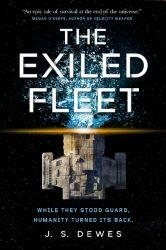
This is the sequel to Dewes' "The Last Watch". This book unfortunately no longer has the same antagonist. That conflict was resolved in the first book, so my favorite part of the last book is no longer a factor. This is not, however, the reason that I only gave this book a 4/5. I did not enjoy the content overload provided in "The Exiled Fleet". I enjoyed the increase in character development, but it lead to simply too much information. This also led to situations that only felt like they were there to develop one character before being cast aside. An example would be the airlock situation between Rake and Snyder. It felt really good to conclude the relationship between Cavalon and Snyder, but I wish there was more with Snyder before the entire book shoved more information and content about the next biggest thing. The content overload was my least favorite part of this book. My favorite part was, ironically, the character development. Rake dealing with trauma over Griffith, Cavalon's relationship with his grandfather, and the surge of sudden Jackin development. It's difficult to explain how my least and most favorite parts of "The Exiled Fleet" were the same, but it makes sense when the book is read.
Reviewer Grade: 11
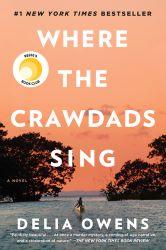
Where the Crawdads Sing, written by Delia Owens, detail the fictional account of Kya and her survival in the marsh of North Carolina. After her mother is beat one too many times by her father, Kya's mother leaves, leaving Kya to fend for herself - against her abusive dad and the wilderness. Kya learns the value of self-reliance, she falls in love with the marsh and its functions and importance to the ecosystem. She also, however, feels the urge of having human company, and her adventures of falling in love (and back out) are incredibly detailed and heart wrenching. My favorite part about this book was the imagery; the way simple things, like leaves falling off of a tree, were described it felt as if I was standing right next to Kya, watching the leaves fall with her.
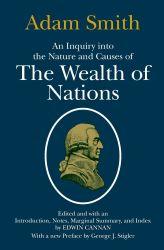
The Wealth of Nations, written by Adam Smith, is the precursor to modern economics as we know it. Smith delves into seemingly everything, from why taxes on gold are less than silver (the answer: because gold, unlike silver, is easily refineable and is far more valuable per ounce. if a high tax on gold were to occur people would have an incentive simply to hide the gold which would be easy because it is smaller to hide/can be hid in a purer form) to how specialization gives way to most profit (for example, 10 men each creating their own pins would be far less efficient that 10 men creating the same pin. Creating the same pin could be divided into smaller tasks, with one person primary repeating one task. This would allow for far more efficiency than individuals doing all the parts of pin making - cutting the wire, flattening the head, attaching the head, sharpening the head, etc - by themselves. The only reason I gave it a four was because of the difficulty I had reading it. When reading, I needed to stop and use the dictionary almost every page because I did not know words. I would definitely not recommend this for a reader looking for a leisurely read. It was anything but.
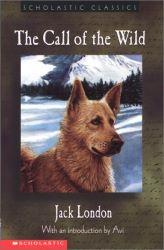
"The Call of the Wild," written by Jack London, is a novel set in Yukon, Canada during the Klondike Gold Rush. Buck, a rather large, domesticated dog, is stolen from his comfortable life and sold into the brutal world of sled dog teams in the harsh wilderness. Buck quickly learns to adapt to his new environment, tapping into his primal instincts as he navigates the challenges of survival. He forms a bond with John Thornton, a kind-hearted prospector, but Buck never feels free, and he contemplates breaking his friendship with John Thornton to escape into the wild. I enjoyed the book because I am an animal lover and I liked reading about the events that Buck endured. Subsequently, I would recommend this book to animal lovers because, after all, it is about a dog and his strive for freedom.
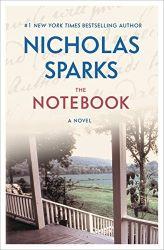
"The Notebook", by Nicolas Sparks, is a fictional love story about Noah Calhoun and Allie Hamilton. They are each other's first love, but societal pressures and World War II separate them, leading Allie to become engaged to another man. Allie, before getting married, visits Noah to see if she is making the right choice. However, she soon realizes that she never stopped loving Noah and becomes torn over Noah and her fiance. I enjoyed the book, however, sometimes the conversations seemed forced and stereotypical. I would, however, recommend this book to anyone who enjoys a good love story
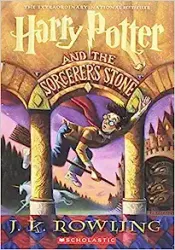
Harry Potter was an incredibly amusing read, with amiable characters that truly made the story stand out. This novel is a must-read for people of all ages. It has an air of mystery, is captivating, and provides entertainment. The book portrays real-world events in a fantasy world.
The characters, including the main character Harry Potter, are relatable and undergo character development while making mistakes. One of the great features of the novel is how each character has their own unique strengths and weaknesses, and each one has a distinct way of feeling. For instance, Neville Longbottom is a shy boy, but his loyalty to his friends and his house team is unwavering.
Harry Potter is a book that can be enjoyed by all ages, as it accurately portrays the struggles that come with different stages of life. Even though Harry is a wizard, his teenage problems are relatable to those of a typical teenager. As a reader, you can judge the characters in the book based on the tone of the novel. Relationships are also a significant feature of this novel and are portrayed differently depending on the type of relationship. For example, the relationship between a sibling and a friend is distinct but can be differentiated only by the tone or mood portrayed accurately.
This book is an absolutely enchanting experience, overflowing with captivating magical creatures, spells, and enchantments that will undoubtedly keep readers completely engaged. The characters are exceptionally well-crafted and relatable, while the plot moves at a fast pace, leaving the reader on the edge of their seat.
The author's vivid and immersive writing style transports readers into the heart of the story, allowing them to experience it as if it were their own. At Hogwarts, Harry befriends Ron Weasley and Hermione Granger. The trio works together to unravel the mystery surrounding the Sorcerer's Stone. In their quest to counter Voldemort's plan to use the stone to regain his body, Harry and his friends embark on a perilous adventure.
Overall, Harry Potter and the Sorcerer’s Stone is a timeless classic that continues to interest and entertain readers of all ages. It is a must-read for anyone who loves fantasy, adventure, and magic. I highly recommend this book to anyone who hasn’t read it yet.
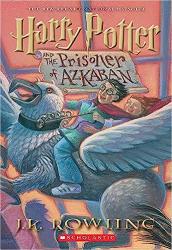
Harry Potter and the Prisoner of Azkaban is the third book in the Harry Potter series. This book is a must read if you enjoyed the previous two books.
Harry Potter, a wizard going into his third year at Hogwarts School of Witchcraft and Wizardry, has a connection to the escaped serial killer, Sirius Black. Black now is thought to be trying to murder Harry Potter on behalf of Voldemort. Dementors are sent to the campus of Hogwarts in order to keep students safe from Black. Hermione is juggling taking 12 classes and being busier than ever. Her cat is set on killing Ron's sick rat creating tension in the trio. Professor Lupin, the new Defense Against the Dark Arts teacher, helps Harry cope with the awful affect the dementors seem to have on him. Meanwhile, Harry tries to discover the tie between Black and himself.
I read this book because I was a fan of the previous two books in the series. The characters and setting in this book make it easy to fall in love with. The author uses imagery to make it feel as if you are really there with the characters. This made the book an absolute blast to read. The ending tied everything together and prevented loopholes in the plot. I disliked the ending in the regard that Harry didn't get his happily ever after.
Harry Potter and the Prisoner of Azkaban is the third book in the Harry Potter series. This book is a must read if you enjoyed the previous two books.
Harry Potter, a wizard going into his third year at Hogwarts School of Witchcraft and Wizardry, has a connection to the escaped serial killer, Sirius Black. Black now is thought to be trying to murder Harry Potter on behalf of Voldemort. Dementors are sent to the campus of Hogwarts in order to keep students safe from Black. Hermione is juggling taking 12 classes and being busier than ever. Her cat is set on killing Ron's sick rat creating tension in the trio. Professor Lupin, the new Defense Against the Dark Arts teacher, helps Harry cope with the awful affect the dementors seem to have on him. Meanwhile, Harry tries to discover the tie between Black and himself.
I read this book because I was a fan of the previous two books in the series. The characters and setting in this book make it easy to fall in love with. The author uses imagery to make it feel as if you are really there with the characters. This made the book an absolute blast to read. The ending tied everything together and prevented loopholes in the plot. I disliked the ending in the regard that Harry didn't get his happily ever after.
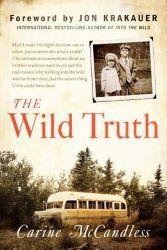
"The Wild Truth" is Carine McCandless' follow-up to Jon Krakauer's "Into the Wild". Carine McCandless wrote this novel after being pained by the reactions to "Into the Wild", especially the general opinion on Chris McCandless' self-inflicted exile from common society. This book succeeds in explaining more of Chris' life before his hitchhiking escapade. These sections were my favorite part of the book: unfortunately, they were mostly only present in the beginning. I struggled to pull through the longer sections where Carine explained her own life. Parts felt unnecessary, other section dragged on too long, and even more just felt completely unrelated to Chris or "Into the Wild". I wanted to read this book to understand Chris. I enjoyed learning about Carine, but I was reading for Chris. I'm quite lucky that I can't relate to large parts of this book. "The Wild Truth" really drags the reader along to help them understand the terrible abuse in the McCandless family. I can understand the difficult parents; I can relate to the family drama, constant switching between divorce and being back together, etc. that Carine had to live through. Regardless, this book stepped too far away from "Into the Wild" in a way that I did not enjoy. However, this book was still informative about the general McCandless family. There are absolutey readers in the world who can take more from this book than I could, but I will never consider this one of my favorite books.
Reviewer Grade: 11
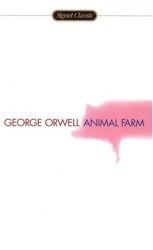
Animal Farm is a book where animals on a farm represent the Russian Revolution. The animals rebel against the farmers to try and escape cruelty and be free. But, it doesn't end up going as planned, and things start to go wrong on the farm. I thought that this book was very educational and it was interesting to see how people, who were represented by the animals, can change so fast. I would recommend this book to anyone who has an interest in history and the Russian Revolution.
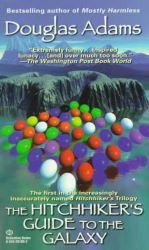
A Hitchhikers Guide to the Galaxy was a funny but interesting book. The book is about aliens destroying Earth to make way for an intergalactic bypass, and it follows a few characters trying to survive the universe that they've been put into. There were also many comedic moments, including strange things that the characters need in order to survive and be safe out in the galaxy, such as a towel, which is really important. The only thing I didn't really like about this book was that it was really difficult to understand at times. There were lots of confusing moments and new things just kept coming. But at the end of the book most of it started to make sense. Overall I thought this book was a great read if you like humor and are interested in space.
Reviewer Grade: 8
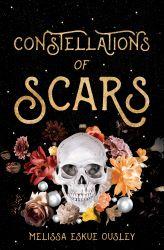
This is definitely an eventful book. "Constellations of Scars" follows Amelia Weaver. For unexplained reasons, she grows pearls on her skin every month. Her mother keeps her shut inside the house, restricting her freedom. One day she decides to escape and try her hand at the real world. She ends up working for a freak show, though they are unaware of her own oddity.
Let's start with the characters. Amelia herself is perfectly acceptable. She doesn't have any noteworthy character traits, or anything to help her stand out besides the whole pearl thing. However, her motivation is clearly defined and all of her choices make sense. Gabe is probably the best character in the book. His backstory is interesting, and his somewhat reclusive demeanor is off putting without being unlikeable. Unfortunately, most of his character development happens within ten pages. Peter is... interesting. I'll talk about him in the spoilers section.
The best part about this book is the writing. It keeps the reader engaged the whole way through. While the descriptions are detailed, the author does not dwell on them long enough to bore the reader. One interesting thing about this book is the chapter length. While there are long chapters, there are also chapters that only last a few pages. I found that this kept the story at a fast pace, further keeping me involved.
The plot is the main failing of the book. Spoilers from here on out. It starts off strong, setting up themes of isolation and hiding. Several conflicts were set up, most notably Amelia's mother and the possibility of the world finding out about her secret. However, all of these conflicts are suddenly solved halfway through the book. From that point on, it shifts to a thriller about Peter secretly being a serial killer. I'm not kidding. There are hints that Peter isn't as nice as he appears, so it doesn't come out of nowhere. However, it drastically shifts the course of the story, to the point where it feels like two separate stories.
Despite this criticism, this wasn't a bad book. I enjoyed myself while reading it. Furthermore, it's a quick read (perfect for car trips or bedtime). If you're looking for an engaging story with twists and turns, this is for you. If you're looking for a cohesive story with interesting themes, this book isn't for you.
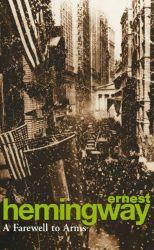
A Farewell to Arms, written by Ernest Hemingway, details the account of Frederic Henry, a medic for the Italian army during the Italian campaign of World War One. He is sent to the front lines of the war, and while he is eating dinner, a bomb explodes over him and he is injured. During his recovery process, he falls in love with Cathrine Barkley, an English nurse. Henry soon desires to leave the army and will do so in any means possible so that he can escape and be with his Ms. Barkley. I enjoyed the book because it was quite satirical, except the humor was quite advanced, so I would recommend this book to teenagers and adults. Overall, however, it was grammatically unique and I believe that I have become not only a better reader from reading this book, but a better writer as well.
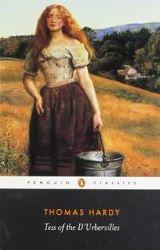
WARNING: This reveiw and this book contains discussion of sexual assult.
Tess of the D'urbervilles is an excellent book. It tells the story of Tess Durbyville, who's father has become obessed with the idea of their noble heritage. After an incident with the carriage, the family is left in financial peril. Tess agrees to work for her supposed relations. However, this leads her into the arms of Alexander D'urberville (who is not actually related to her).
Tess herself is a great protagonist. She's well defined as a dreamer who is devoted to her family. Both of these traits help her, but cost her dearly. Alexander is a more complex antagonist than you'd first assume, while still being hatable. Angel Clare is a good character as well, he has well defined traits, but I was not able to end up liking him. He admits to not being a Christian, and not believing in all of the doctrines of the Bible (just to clarify, almost all of today's Christians would take issue with the way Angel treats Tess). Furthermore, he openly admits to his parents that he does not have the same beliefs he does. Yet, he still abandons Tess because of these beliefs (that he doesn't have).
That brings me to the major problem. Tess is constantly thinking about how Alexander is her true husband, and how she is ruined. While these are realistic things for someone in her predicament to think, I felt that the book does not take a strong enough stance against these beliefs. If it wasn't for this, I would have given the book 5 stars (if I had the option, I would have given it 4.5). Tess of the D'urbervilles has excellent prose, shocking twists, tragic moments, and great character progression. If you are not uncomfortable reading about sexual assault and you enjoy classic literature, I would recommend this book.
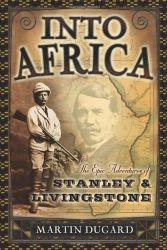
Into Africa, written by Martin Dugard, details the epic adventures of Stanley Livingstone and his trek across Africa to find the source of the Nile River. Livingstone battles disease, unfriendly tribes, and stubborn porters (the people who help carry supplies) in his journey. The brutal, but beautiful march encompasses Africa from it sweltering hot savannahs to it thick rainforests. I would recommend this book to anyone who likes adventure because this book is about the exploration of Africa. I enjoyed this book because it taught me a lot more about Africa and it's people.
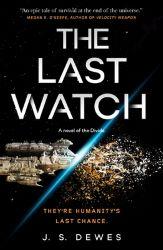
This is Dewes' fantastic debut novel about space, politics, and unknowable existence-ending eternal temporal torment. In fact, that last detail is my favorite part about the book. Not only is it an extremely interesting and unique concept for an antagonist, it is also a great antagonist. It is something that can be understood by the reader, but can't reasonably be understood by the reader. It in itself is a paradox that works as possibly my favorite antagonist this year. Again, it is simply the greatest unique idea I have read in a long time. I picked this book because I also loved Dewes' novel "Rubicon", so I looked for more books by the author. I honestly can't pinpoint a criticism that I have with this book. This book had just enough surprises where I was absolutely entertained, but I could still keep track of what was happening and which characters stood for what. I could relate to Adequin in her feeling of being inadequate (and actually being inadequate) for her assigned position. This book is a strong contender for being the greatest book that I have read this year.
Reviewer Grade: 11
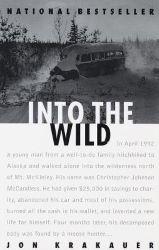
Jon Krakauer's "Into the Wild" might be the greatest nonfiction book I have read this year. I was assigned this book to read over my summer break for my English class. I am extremely grateful for this because it was very likely that I would not have discovered this masterpiece on my own. My favorite part about the book was the exact thing that Krakauer wared about in his forward; the author's similar personal experience. In a more general term, I savored every moment where Krakauer connected McCandless' story to other lesser-known examples in history, like John M. Waterman or Gene Rosellini. My least favorite part about the book wasn't explicitly in the book: the lack of definitive information outside of Into the Wild about McCandless makes me doubt some of the credibility of the information that Krakauer provided. Even if the factual information was true, I am still confronted with the author's admission that some of the details in the book were opinionated by Krakauer. The book was full of surprises. I will not spoil any, but the father's reaction when seeing "the scene" shocked me. I personally could not relate to any of the characters in this book. I lack the all-consuming drive to
reach a mostly independent state from society, and I have never fretted over a lost child. Regardless of my lack of a personal connection, this book was an extremely powerful book about those in society that wish to be outside society.
Reviewer Grade: 11
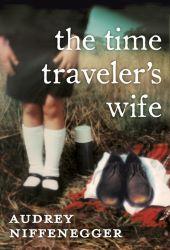
"The Time Traveler's Wife", written by Audrey Niffenegger, is the fictional account of Henry DeTamble, a man with a unique genetic condition that causes him to involuntarily time travel, and his wife Clare Abshire. The narrative follows their love story as they navigate the challenges posed by Henry's sporadic disappearances and unpredictable reappearances at various points in time. I really enjoyed how the plots all came together; while Clare aged normally, she would see Henry at different stages of his life. For example, when Henry time travels, he sees Clare when she is 13 and when he is 35. Another time Henry was 28 whilst Clare was 20. Clare's development was linear, while Henry's was sporadic. I would recommend this book to adults who enjoy a good love story. However, there is some adult content in the book so I would not recommend it for children or teenagers.
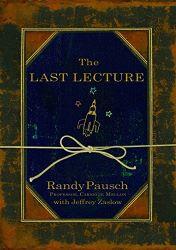
"The Last Lecture" is a non-fiction book based on a lecture delivered by Randy Pausch, a computer science professor diagnosed with terminal cancer. Pausch's lecture, titled "Really Achieving Your Childhood Dreams," was delivered at Carnegie Mellon University and became a sensation, garnering millions of views online. The lecture was eventually turned into a book by Jeffery Zaslow. In the book, Pausch expands on the themes from his lecture, sharing his wisdom, insights, and life lessons as he confronts his mortality. He encourages readers to pursue their passions, live fully in the present, and embrace the power of perseverance and resilience. Pausch's poignant and inspiring message serves as a reminder of the importance of cherishing every moment and making the most of the time we have. I believe his heart-wrenching story should be shared with everyone. We are all mortal in the end, but most of us choose to act as if we are not; Pausch encourages us to not waste the valuable time that we have.
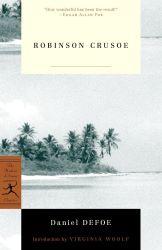
"Robinson Crusoe" is a fictional novel by Daniel Defoe; telling the story of Robinson Crusoe, a young Englishman who becomes stranded on a deserted island after a shipwreck. The novel follows his solitary existence as he learns to survive, building shelter, finding food, and adapting to the challenges of his new environment. Over the years, Crusoe encounters both moments of despair and triumph, offering readers a captivating tale of resilience, self-reliance, and the indomitable human spirit. I was fascinated by this book; if I were to compare it to another book I would say that it is the grown up version of Hatchet (written by Gary Paulsen). I would recommend this book to anyone who enjoys a good adventure novel.
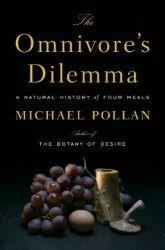
The Omnivore's Dilemma, written by Micheal Pollan, provides the reader with an analytical view of what we, as humans, should eat. He dives into the industrialization of corn production. Because the government of the United States subsidizes corn, more farmers produce corn than in a free market society, thus there is a surplus of corn. With this surplus, industries evolved to consume the cheap, plentiful corn. One example is the concentrated animal feeding operation (CAFO, commonly referred to as a "feedlot"). People feed cows (that are packed in fences) the cheap corn, which decreases the price of the cows, which then leads to the creation of more business selling far more affordable cow meat, such as McDonalds. Although the food is far more accesible and less of a budget burden, Pollan raises questions about the health externality of eating corn fed cows. Because the cows are packed together, disease tends to run rampant, so the cows' food (chopped up corn) is mixed with a variety of antibiotics and hormones to control disease. When we eat the cow, what is fed to the cow is now fed to us. I enjoyed the book because it made me more cognizant about the food I put in my body, and I would recommend this book to anyone who is curious about the logistics of how and where we get our food.
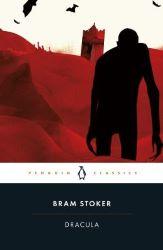
Dracula, written by Bram Stoker, is a fictional account of a vampire hunt in Transylvania. Jonathan Harker, a lawyer, is sent by his boss to Castle Dracula to assist in a real estate transaction with a wealthy man named Count Dracula. However, he is soon not allowed out of the castle, and slowly he realizes the the Count is no ordinary man. Harker manages to escape and eventually teams up with a colleague to hunt down Count Dracula. I enjoyed the book, it was full of complex back stories that merged into one beautiful crescendo: the hunt of the Count. I would recommend this book to anyone wanting to expand their vocabulary, as the book is rich with complex words and sentences. I would also recommend this book to avid readers; (as it is a classic) it should be ensured that to be a genuine reader one must read this famous work of art.
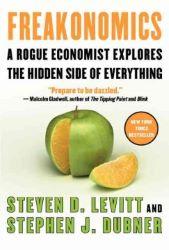
"Freakonomics" written by economist Steven D. Levitt and journalist Stephen J. Dubner, explores unconventional connections between economics and various aspects of society, challenging conventional wisdom. Levitt's research delves into topics such as the economics of drug dealing, the impact of parenting on a child's success, and the hidden motivations behind seemingly irrational behaviors. The authors highlight the power of data analysis and critical thinking to uncover surprising insights. The book ultimately encourages readers to question assumptions, think outside the box, and view the world through an economic lens to gain a deeper understanding of human behavior. I recommend this book to anyone who enjoys economics, as well as questions conventional ideas of society.
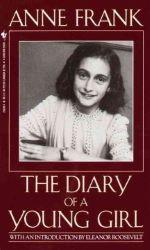
"Diary of a Young Girl" is the poignant and haunting diary of Anne Frank, a Jewish teenager hiding from the Nazis during World War II. Anne chronicles her life in hiding in Amsterdam, where her family sought refuge in a secret annex. Through her diary entries, she shares her hopes, dreams, fears, and frustrations, providing an intimate account of the daily struggles and emotional turmoil endured by Jews in hiding. I enjoyed the book; having experience the Covid-19 shutdown, the atrocity that she had to go through put my life into perspective. Sometimes what individuals go through is difficult, but is nothing compared to horrors experienced by others. I recommend everyone to read this book because it fosters a sense of humility in all that read it.
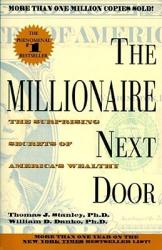
The Millionaire Next Door is a collection of studies about the secretive habits of millionaires done throughout the course of Thomas J. Stanley's career. He juxtaposes making a lot of money with being wealthy: you can make an incredible salary, but to be wealthy you have to save that earned money. For example, in the book there are two examples: One is a man who has been living in the same small house for 20 years, drives a 10 year old truck, and uses a Casio Duro (an affordable watch). The other is a doctor who earns $700,000 dollars a year. The doctor has an enormous house, fancy new cars, and embezzles his wife with divine jewelry. Obviously, the doctor is rich, right? Incredibly, the doctor's net worth is less than "the regular joe's". The doctor's obsession with having consumer goods limits his net worth. His need to "fit in" necessitates him spending almost all of his net worth on tangible goods. From the outside, he appears rich, but on the inside he has little retirement savings and no mental bandwith to focus on the far future. Meanwhile, the man who has been living in the same house for 20 years has seen the value of his house triple. His affordable lifestyle allows him to not only live below his means, but to invest his time (not spent shopping) and money wisely so that he builds a fortune. The Millionaire Next Door teaches us that the typical millionaire as seen by society (fancy clothing, the "newest iPhone", etc) is not actually a millionaire, but rather an
under-accumulator of wealth with nonexistent sapience in regard to the future. I would recommend this book to those who want to be wealthy in the future because becoming wealthy does not occur overnight: it takes years of discipline, sacrifice, and integrity. And the best time to start on your financial journey to freedom is now.
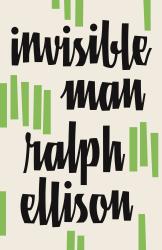
"Invisible Man" by Ralph Ellison is a powerful and thought-provoking novel that explores the complexities of African American identity in a society that refuses to see them as anything but invisible. Published in 1952, the book tells the story of an unnamed narrator who struggles to find his place in a world that constantly denies his existence.
The novel is set in the early 20th century and follows the narrator's journey from his youth in the South to his experiences in the North, where he encounters racism, violence, and exploitation. The narrator's quest for identity is complicated by the fact that he is not only a black man in a white-dominated society but also an individual struggling to define himself.
Throughout the novel, Ellison employs richly symbolic imagery to convey the narrator's experiences and emotions. The use of motifs such as blindness, invisibility, and masks emphasizes the ways in which society seeks to hide or ignore the realities of racism and prejudice. At the same time, the narrator's invisibility serves as a metaphor for the struggle of African Americans to assert their identity and agency in a society that denies them these basic human rights.
Ellison's prose is both poetic and poignant, as he explores the complexities of race, identity, and power. He also addresses issues of class and gender, as the narrator navigates the world of white power brokers, black nationalists, and women who seek to control him.
Overall, "Invisible Man" is a powerful and important work that continues to resonate with readers today. It is a testament to the enduring legacy of racism and inequality in America, and a call to action for all those who seek to create a more just and equitable society. If you have not read this book yet, I highly recommend that you do so.
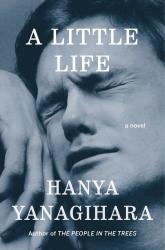
"A Little Life" by Hanya Yaragihara is a commendable literary fiction which will make you cry and smile, often both at the same time.
I read this book last year and I still think about it sometimes and that's how I know it's a good book.
Honestly, saying it's a 'good' book is an underestimation.
My sincerest apologies.
Let me correct myself, A Little Life is not a good book, it's a magnificent book. A fine piece of literary fiction.
After a couple of decades this book is going to be considered a classic from this
generation. I have dibs on it.
Reading it was quite an expedition,
It was as if I rode a rollercoaster of
emotions;
whereupon I felt the highest of highs and lowest of the lows, varying from small soothing ecstasies to immense crestfallenness.
The book is bildungsroman of sorts which simply means we follow characters from their childhood towards their adulthood and we basically read them go through their lives.
We circle the lives of four college friends, based in nyc, who technically grow up together.
But our focal point resides on Jude, our protagonist, whom we adore!
A little context: In his adult life, he is a successful litigator who has got his act together,
but little do we know, he's been through hell and back. We untangle his mind-boggling mysteries on this expedition of ours. Its a tragic tale really but despite the unfortunate trajectories there is something so beautiful and pure about this book,
I guess what I'm referring to is friendship.
The bond these college friends share.
These characters grow on you, you can tell they're written with love.
They re so complicated and real and even relatable, sometimes.
Moreover, text is simply elysian. I needn't say more.
The beauty is in the details, in the intricacies.
Once you get through the initial fifty pages, it'll grow on you indefinitely.
and it'll become unputdownable and your fingers would ache since its a mammoth of a book. And you're dread it when you're nearing the end,
dread it because you do not want it to end yet,
thats how lovely these people are, and their story is. Well, lovely and sad.
Once you devour the text,
you'd miss them.
your heart would be left rended all over the place, like mine was
and you'd think how the text wasn't long enough, like I did after reading 800 something pages,
I wished there were more to the book.
Adding some trigger warnings for this book at the end of my review-
sexual abuse, child sexual abuse, scary verbal abuse, psychological manipulation and gaslighting, kidnapping/
imprisonment, many modes of self-harm, suicide, rape.
I think I covered them all, look trigger warnings up once just to be sure.
Read this book. I insist and assure you will have a good time.
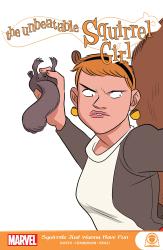
After reading the second collection of The Unbeatable Squirrel Girl, I was a little worried that this third collection would be more of the same. Comedic situations involving a variety of Marvel heroes and villains punctuated by some silly squirrel-based shenanigans. And while The Unbeatable Squirrel Girl: Squirrels Just Want to Have Fun has these things, there was also a fair amount of character growth for the titular superhero.
I appreciated that this volume included some of the lore surrounding Squirrel Girl, especially since we've only seen her in modern settings in most of these issues. Knowing what it was like growing up as Squirrel Girl helped ground the character a little more and make her relatable. The arc where she teamed up with Ant-Man was also entertaining because of the change of scenery (everything is in New York, give Canada a chance!). Still, these comics were a bit "samey" to the rest of the ones in the previous two volumes.
What really struck me in this collection was the "flying squirrel" arc. Being unbeatable can become a bore after a while, so giving an antagonist that was clever enough to push Squirrel Girl to grow as a hero was a refreshing change. Perhaps my exposure to shonen-type mangas where the characters power up and grow stronger in each arc is what drew me to this story. Because while having the powers of and over squirrels is a neat trick, being able to fly is a significant upgrade to this superhero's arsenal of abilities. Plus, flying squirrels are inherently cool creatures anyway.
More Squirrel Girl adventures with good character growth added in, I give The Unbeatable Squirrel Girl: Squirrels Just Want to Have Fun 4.5 stars out of 5.
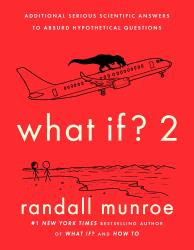
As a fan of XKCD, I've loved the What If? spinoff series despite how irregularly Randall has updated it. Considering there have only been five new posts in the last five years, and they were all in the months leading up to the release of this book, I needed a good dose of What If? Partly because it had been so long since I had read any What If? posts, all the chapters in this book felt fresh and hilarious. Now that I read through it, I'm sad that I'll have to wait another eight years for a third book in the series.
Randall always has a down-to-earth style of describing incredibly complicated scientific concepts. This means What If? 2 is quite educational once you get past the ridiculous premises that readers have sent in. It's also nice how each chapter is easily readable in a few minutes so that I could just pick it up and get a good laugh before moving on to something else. After all, this book is straight-up funny. This should come as no surprise—again—given the absurd questions readers asked Randall.
It felt like this book had more new content than the previous book in the series. This might not be true, but it felt that way because I hadn't read any of the posts that made it into this book in several years. This was my main qualm with the first book: that it was just a printed-out part of the internet. In this sequel, there weren't just new questions answered but also quick little sections that covered easily answerable questions (as compared to its predecessor's highlights of disturbing questions with no answers). Overall, I found it to be a fun read and I'm counting the days until What If? 3 comes out.
Hilarious and scientifically accurate answers to oddball questions, I give What If? 2 4.5 stars out of 5.
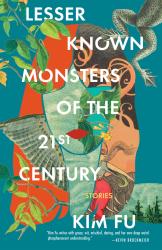
Canadian author Kim Fu provides 12 entertaining, oft challenging and daring stories in her latest award-winning collection (Feb. 2022, 232 pages).
She does a skillful job of taking extraordinary circumstances, such as a tween girl sprouting wings and turning that into a believable rite of passage. In another, a Bridezilla meets a sea monster and what follows is a witty commentary on social expectations and ecological consequences.
All the stories blur the lines between reality and the fantastic, and the weird and mundane, all while shining a spotlight on human contradictions concerning sexuality, death, guilt and technology.
As a result, all prove memorable for different reasons, making this collection one of the few worth reading in its entirety.
AWARDS: An NPR, Book Riot, Chicago Public Library, Tor.com, South China Morning Post, Ms. Magazine, and Shelf Awareness Best Book of 2022; 2023 Pacific Northwest Book Prize Winner; Time Magazine Top 10 Fiction Book of 2022